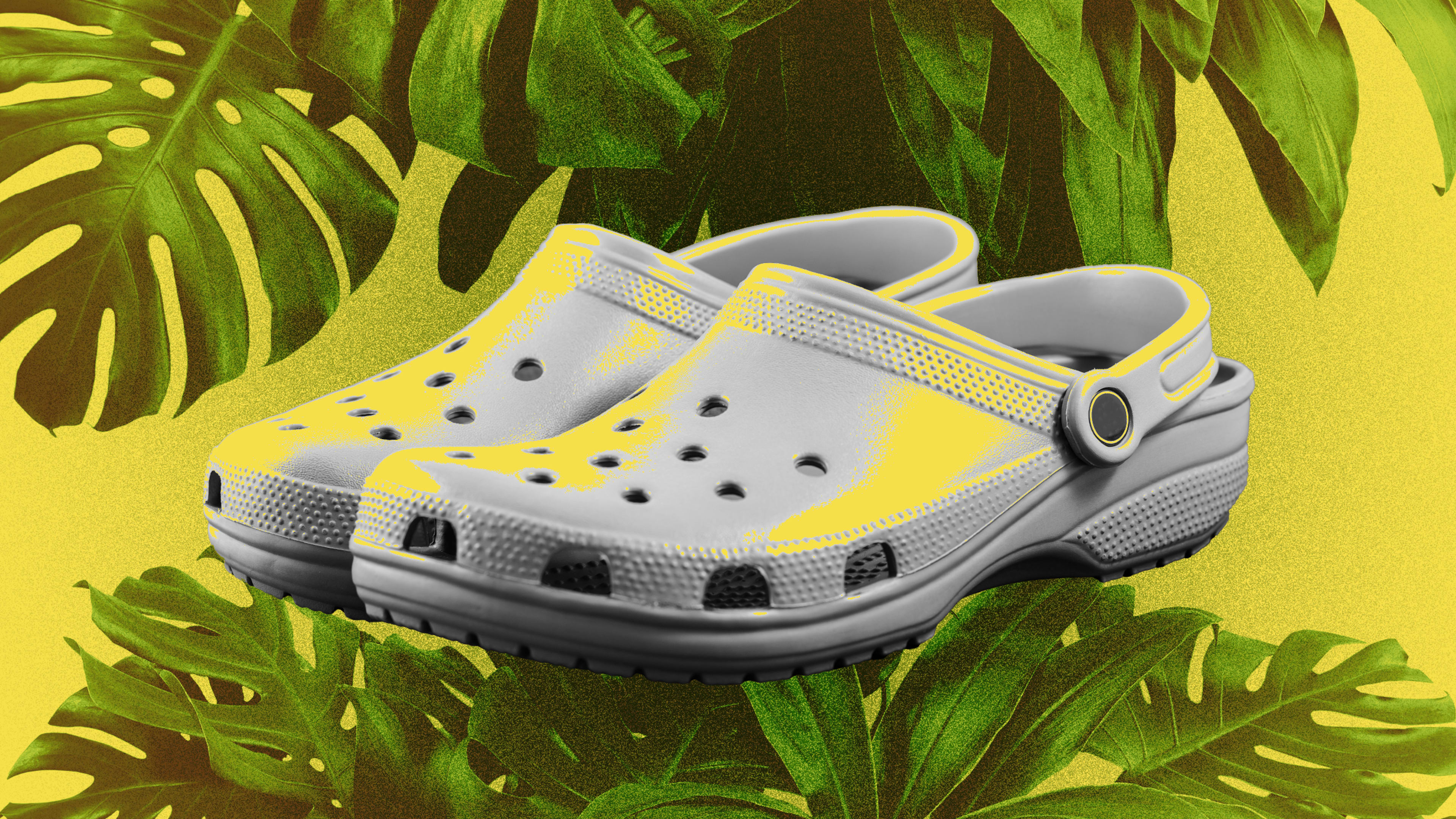From pandemic accessory to red-carpet trend, Crocs are hotter than ever this year. But the brand is also focused on another type of heat: climate change. Sure, the gradual boiling of our planet is markedly less fun than, say, a catalog of mini lightning bolt-, lava lamp-, and avocado-shaped charms—all of which you can buy from the Crocs website and stick in the various pores of its iconic rubber clogs—but the company wants to make fighting climate change just as core to its brand as those colorful pins.
As the first step in its quest to become net-zero-carbon by 2030, Crocs is remaking its shoes with a new bio-based material, the company announced today, set to debut across all styles in 2022.
The material, called Ecolibrium technology, was engineered in collaboration with global materials science company Dow. It’s built with hydrocarbons extracted from renewable resources and waste products, rather than natural gases, forming what the company says is a carbon-negative process—all while keeping the same feel as the OG Croc. Crocs has been transparent about the carbon footprint of its shoes in the past—3.94 kilograms of CO2 per pair, already on the low end for the industry—and the introduction of Ecolibrium is going to bring that number down a lot further, it says, although it’s unclear on exactly how much.
Crocs unveiled its ambitious zero-carbon goal this past July, which CEO Andrew Rees tells Fast Company was in the works for several years. But perfecting the bio-based shoe was a key catalyst in accelerating the plan. “Without the sustainable material, this would be hard to achieve,” says Rees. Of course, there are still challenges ahead: Renewables are still costlier than regular sources, and Crocs is constrained by Dow’s supply bandwidth, which it believes will be the biggest rate-limiting factor. The new shoes won’t be 100% Ecolibrium, but will feature a percentage of eco-friendly material that the brand hopes to increase to 50% by 2030.
If the shoe fits, reckon with it
Crocs is one of many companies that has flown the banner for environmental causes in the midst of a sustainability revolution. Consumers, largely led by the socially conscious Gen Z cohort, are now demanding that big businesses reckon with their negative impacts on the rest of the world: greenhouse gas emissions, deforestation, animal cruelty, and slave labor. Companies from Amazon and Ikea to Zara have signed climate pledges and started recycling programs. It has become unquestionably cool to care, and the footwear industry is no exception: Check the website of any buzzy shoe brand—Clarks, Vans, Veja—and chances are there’s a page dedicated to sustainability.
But according to Rees, a couple things make Crocs unique. For one, it’s transforming all its products to greener material, rather than taking the common route of launching a handful of sustainable options. “Most companies do that so they can charge a premium,” says Rees. It’s not hard to guess which: For example, Nike’s much-hyped Space Hippie collection, which is created with scraps of recycled shoes, retails for upwards of $180, nearly a hundred dollars more than some of the brand’s classic styles. Converse’s Renew collection costs roughly $20 to $30 more for a few fancy-looking, earth-friendly designs. According to the Crocs team, its revamped footwear will sell for the same price as before, and includes all of its signature looks and models. “We like to use the line, ‘green comes in every color,'” says Rees.
To another point, Rees draws a distinction between companies that seek to actively reduce their gas emissions versus those that try to reach net-zero carbon solely through offsets, a tactic he says customers consider “disingenuous.” An offset could mean a company upcycling its goods after use—such as Teva’s Forever program, which turns old sandals into running tracks and playgrounds—or promising other good deeds, such as Cariuma vowing to plant 10 trees for every shoe sold. While positive, one could argue those solutions miss the root of the problem. But Rees says Crocs is committed to doing the hard work of bettering itself from the core: “Our net zero includes the whole footprint—not just how we operate the company, but also all of our products.”
Unlike a Teva sandal, it’s difficult for a Croc to be broken down and repurposed due to the tricky nature of plastics. But that’s perhaps negated by the shoe’s ridiculous longevity—owners claim they practically last forever. Crocs also runs a “second life” donation program that brings used shoes to impoverished communities, and says its new bio-based formula “enhances our ability to explore a circular supply chain in the future.”
An enduring challenge of sustainability is balancing profitability, which can be hard to attain. Take Allbirds’ recent IPO prospectus, for example, which reveals that the company expects to “incur losses for the foreseeable future.” But Crocs is optimistic that its sustainability push will do more than just bring cleaner air; it could also bring in cold hard cash. While the company touts a broad consumer base—doctors, chefs, pop stars, school kids—Rees believes a focus on sustainability will grow its clout with the valuable Gen Z demographic, which historically hasn’t been a major segment. As he puts it, “the younger consumer is increasingly looking to buy brands that they think are doing the right thing.”
This post has been updated to remove an earlier reference to palm oil, which was an oversimplification of Ecolibrium. The technology uses a byproduct from the palm oil-refining process, not palm oil itself.
Recognize your brand’s excellence by applying to this year’s Brands That Matter Awards before the early-rate deadline, May 3.
